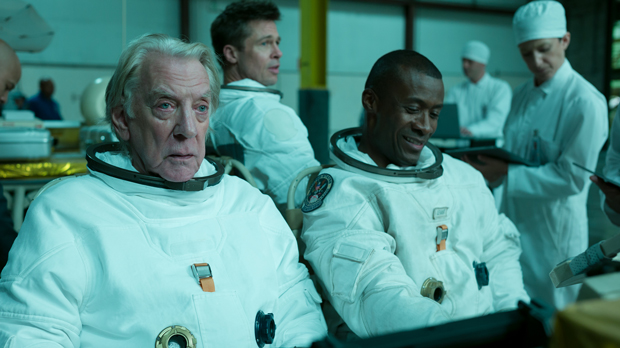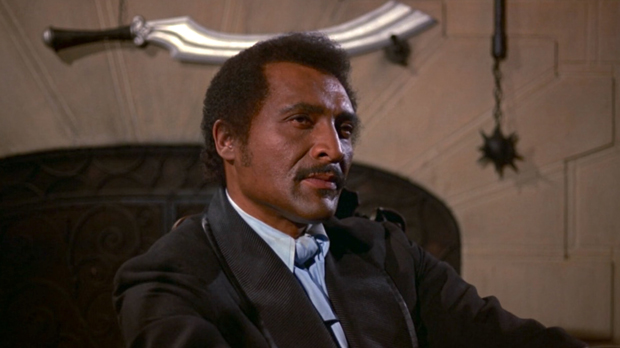 Ad Astra (2019) 20th Century Fox/Sci-Fi-Adventure RT: 122 minutes Rated PG-13 (some violence and bloody images, brief strong language) Director: James Gray Screenplay: James Gray and Ethan Gross Music: Max Richter Cinematography: Hoyte van Hoytema Release date: September 20, 2019 (US) Cast: Brad Pitt, Tommy Lee Jones, Ruth Negga, Liv Tyler, Donald Sutherland, Kimberly Elise, Loren Dean, Donnie Keshawarz, Sean Blakemore, Bobby Nish, LisaGay Hamilton, John Finn, John Ortiz, Natasha Lyonne. Box Office: $50M (US)/$135M (World)
Ad Astra (2019) 20th Century Fox/Sci-Fi-Adventure RT: 122 minutes Rated PG-13 (some violence and bloody images, brief strong language) Director: James Gray Screenplay: James Gray and Ethan Gross Music: Max Richter Cinematography: Hoyte van Hoytema Release date: September 20, 2019 (US) Cast: Brad Pitt, Tommy Lee Jones, Ruth Negga, Liv Tyler, Donald Sutherland, Kimberly Elise, Loren Dean, Donnie Keshawarz, Sean Blakemore, Bobby Nish, LisaGay Hamilton, John Finn, John Ortiz, Natasha Lyonne. Box Office: $50M (US)/$135M (World)
Rating: ***
Once again, I find myself in a position where I have to decide if I’m writing a film review or interpretation. The film in question is Ad Astra, a cerebral sci-fi piece more along the lines of 2001: A Space Odyssey or Solaris (the original 1972 version NOT the lousy George Clooney remake) than Star Wars or any of its imitators. Directed by James Gray (The Lost City of Z), it too deals with a space mission that turns out to be as much a psychological journey as it is a physical one. On the surface, it’s about a man searching for his long-lost father who might pose a threat to Earth. If you read between the lines, there’s an obvious parallel. I’ll get into it later.
Ad Astra, Latin for “to the stars”, is set in a near-future where space travel is as normal as taking a plane somewhere. Brad Pitt (Once Upon a Time in Hollywood) stars as Major Roy McBride, an astronaut with a reputation for keeping calm even in the most intense situations. It’s said that his blood pressure never rises above 80. It’s a gift that keeps on giving as long as he finds himself in situations like the one that opens the movie. While working on an antenna that reaches from Earth’s surface to outer space, a power surge hits sending him plummeting to the ground in a free-fall that would kill any other mortal man.
Roy is called to SpaceCom (Space Command) where he’s told that the source of the surge has been traced to Neptune, the last known location of “The Lima Project”, a mission to seek out intelligent life in the farthest reaches of space, a mission that launched 26 years earlier led by his father Clifford (Jones, The Fugitive). For 16 years, Roy thought that his father was dead. Now it’s not only possible that he’s alive, he just might be behind the attack on Earth as well. Roy’s mission is to travel to Mars (via the moon) and try to establish contact with his dad. Of course, the suits at SpaceCom aren’t telling Roy the whole story about the purpose of his mission.
What we have with Ad Astra is a metaphorical story of a man seeking his father to have some questions about his existence answered. Let me put it another way. It’s about Man searching for an absent Creator who allows disasters to befall a world that has lost hope. The religious allegory is crystal clear when you think about it. Roy’s physical odyssey takes him first to the moon which has become a tourist trap made dangerous by scavenger pirates who roam the surface attacking anybody who dares to tread there. Then he goes to Mars where he’s subject to psychological evaluations by computer while attempting to communicate with his father. Just like Apocalypse Now, Ad Astra shows how the undertaking of an arduous journey changes a man even driving him to madness. If Pitt is the Martin Sheen character, then Jones is Marlon Brando’s Captain Kurtz.
I’ve done as much interpreting as I’d like to do so let’s talk about Ad Astra as pure entertainment. It’s a pretty good movie. Of course, this is from only seeing it once. It occurs to me that I may need to see Ad Astra again in order to fully take it in. I must confess that I didn’t grasp the movie’s deeper themes as I watched it. I had to think about it for a while before I committed a single word of review. Also, it is rather slow-moving. On the upside, Pitt gives his second great performance of 2019. Between this and Once Upon a Time in Hollywood, he’s having a banner year. We’re reminded of the great actor he truly is. Jones is also good as the possibly quite mad father who caused his son all sorts of psychological damage like the inability to communicate with his estranged wife Eve (Tyler in an underwritten role). Ruth Negga (Loving) and Donald Sutherland (M*A*S*H) offer ample support as two people who help Roy on his mission at different points.
The visuals in Ad Astra are absolutely stunning. At the very least, expect this movie to score an Oscar nod for its impressive production design. Also, I love how Gray gives us plenty of close-ups of Pitt’s helmet-covered face without allowing the grandeur of space to overwhelm the picture. From a technical standpoint, Ad Astra is a true wonder. Speaking strictly in terms of narrative, it’s less impressive. It touches on deep themes but it’s not as mind-blowing as 2001: A Space Odyssey. It’s a good movie that I wish was great. Maybe a second viewing will make it so. Stay tuned.




